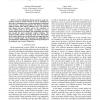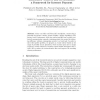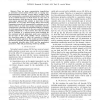100 search results - page 10 / 20 » A Unifying Passivity Framework for Network Flow Control |
SOCIALCOM
2010
13 years 5 months ago
2010
Abstract--As the information flowing around in social networking systems is mainly related or can be attributed to their users, controlling access to such information by individual...
ICUMT
2009
13 years 5 months ago
2009
This paper presents a simple resource control mechanism with traffic scheduling for 2-hop ad-hoc networks, in which the Request-To-Send (RTS) packet is utilized to deliver feedback...
COMCOM
2004
13 years 7 months ago
2004
We demonstrate the benefits of traffic engineering by studying three realistic network models derived from an actual service provider network. We evaluate traffic engineering in t...
FC
1998
Springer
14 years 5 days ago
1998
Springer
From von Solms and Naccache's standpoint, constructing a practical and secure e-money system implies a proper regulation of its privacy level. Furthermore, when the system ben...
CDC
2009
IEEE
14 years 20 days ago
2009
IEEE
— There are many communication imperfections in networked control systems (NCSs) such as varying sampling/transmission intervals, varying delays, possible packet loss, communicat...



